High Pressure

Brief Synopsis
Cast & Crew
Mervyn Leroy
William Powell
Evelyn Brent
George Sidney
John Wray
Evalyn Knapp
Film Details
Technical Specs

Synopsis
With the help of Mike Donoghey, wealthy Mr. Ginsberg searches for promoter Gar Evans. Ginsberg owns a process for making rubber out of sewage, and Donoghey has convinced him that Gar is the best promoter in the world. After Gar sobers up, he agrees to take on the project. He arranges a good deal on a prestigious building for company headquarters, hires an impressive looking man to act as the company president and starts to sell stock. The only thing missing is the presence of Gar's girl friend, Francine Dell. Although he considers her his good luck charm, she is fed up with his schemes and plans to marry a wealthy South American. Eventually, she succumbs to Gar's entreaties and signs on as his secretary. While Gar holds inspirational meetings for salesmen, the company stock sells rapidly and everything looks good until the rubber industry sends an investigator. Gar must prove that they can really make rubber from sewage, but the inventor of the process is missing. In the meantime, to prove that he really loves Francine, Gar turns over his shares in the company to her. Ginsberg finds the inventor, who is not only a fake, but crazy as well. Gar refuses to run out on the company, however, and plans to return at least a portion of the invested money until a lawyer from the rubber company offers to buy them out. In order to sell, Gar must get the stock certificate back from Francine, who is leaving town to marry her South American. He finds her in time and obtains the certificate. Then he begs her not to leave. She agrees to marry him, but as they leave, Donoghey proposes another new deal. At first Gar resists, but as Francine listens resignedly, he starts to plan his new campaign.

Director

Mervyn Leroy
Cast

William Powell
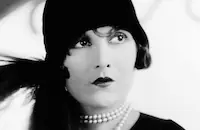
Evelyn Brent
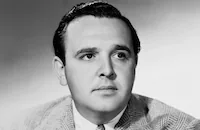
George Sidney

John Wray

Evalyn Knapp

Guy Kibbee
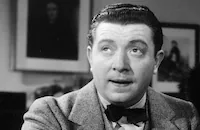
Frank Mchugh
Oscar Apfel
Ben Alexander
Harold Waldridge
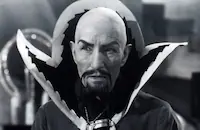
Charles Middleton
Polly Walters
Luis Alberni
Harry Beresford

Lucien Littlefield
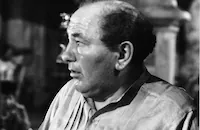
Charles Judels

Alison Skipworth
Maurice Black
Bobby Watson
Lilian Bond
Crew

Videos
Movie Clip



Trailer
Film Details
Technical Specs

Articles
High Pressure
Gags like these are just warm-ups for the picture's main business. Ginsburg knows a great German inventor who can make artificial rubber out of - brace yourself - sewage. "Sewage?" asks Gar when he hears about the invention. "Tons and tons of it, Gar!" Mike answers. "Get yourself into that picture!" As a hustler and promoter, Gar worries that "there's no romance in sewage," but soon he sees the possibilities: a fancy office, a bustling staff, and millions to be made by selling stock in a hot new product. Ginsburg pays for the office and the staff, Gar names the outfit - The Golden Gate Artificial Rubber Company - and they're off and running. When a dopey delivery man named Gus Vanderbilt shows up on an errand, Gar puts him on the board of directors, since the name Vanderbilt adds a touch of class to the company stationery. Investors scramble to buy stock, but competitors start to smell a rat, threatening to bring in the law if Gar and Ginsburg don't start making rubber instead of just talking about it. They can't do that until the great German inventor shows up to decipher his cryptic formula, and Ginsburg is the only one who's ever seen him. There's also the problem of Francine Dale, the girlfriend who loves Gar but can't take any more of his wild schemes. She's running away with a South American millionaire, and without her Gar may wind up back on the speakeasy floor.
All of this is entertaining, and it's even more fun to imagine Production Code censors fainting from shock at the very idea of a movie about sewage, even though the stuff remains mercifully off-screen. High Pressure earns its title from the high-voltage energy of its acting, directing, and dialogue; the cast punches out repartee at a speed anticipating the Howard Hawks of Bringing Up Baby (1938) and His Girl Friday (1940), and while the filmmaking is never fancy, the camerawork and editing keep things constantly in motion, unspooling the story in a snappy 73 minutes with few pauses for breath along the way. Reviews were good in most of the United States, with New York Times critic Mordaunt Hall calling it "brightly written and constantly amusing." Variety praised the "speedy treatment" of a "somewhat different theme in the racketeer style," but complained that Gar, "the leading racket guy," is allowed "to grow too righteous" in the second half.
Joseph Jackson's screenplay is efficiently structured, pivoting around searches - for Gar in the beginning, for Francine and the inventor in the middle, and for a desperately needed stock certificate at the end. It's based on Hot Money, a stage comedy that played on Broadway the same year Warner Bros. produced High Pressure, which contains a couple of gags aimed at the studio and the still-new phenomenon of talking pictures. William Powell was born to play semi-debauched gents like Gar, and Evelyn Brent smolders just the right amount as Francine, the long-suffering woman in his life. Powell and Brent had teamed up in five previous films, including Josef von Sternberg's silent masterpiece The Last Command in 1928, but this was their last picture together. The rest of the cast is terrific in the fine tradition of Warner Bros. character acting. George Sidney is hardly a household name, but he had solid experience in the ethnic-comedy line - appearing in a long list of "Cohens and Kellys" pictures, among other things - and he plays Ginsburg to perfection. Evalyn Knapp is fine as a secretary who has to keep her wedding plans a secret or lose her hard-won job, and Harry Beresford is over-the-top weird as the great German scientist, who bought his chemistry degree from a diploma mill in a bathroom for $17.50. And special kudos go to the inimitable Guy Kibbee as balding Clifford Gray, a drunk who gets to be the company president because he's good at looking important when there's a cigar in his mouth and a toupee on his head. LeRoy's work is especially impressive when you realize that he released six pictures in 1932, starting with High Pressure and ending with I Am a Fugitive from a Chain Gang, a formidable classic. He didn't direct Powell again until Mister Roberts, co-directed by John Ford, in 1955.
The Golden Gate Artificial Rubber Company is pretty much a fraud, but one reason it temporarily thrives is that it has jobs to offer. Getting a job was no joke in 1932, when the Great Depression was at its deepest, and this aspect of High Pressure makes it freshly relevant in our own financially troubled time. It's also pertinent that the entire plot hinges on a total scam - when the great German scientist turns out to be a great world-class lunatic, Gar and company come close to hard time in prison - and present-day viewers can choose which recent financial scandal this reminds them of most. Slightly sick humor makes its appearance on this level of the story too; when the services of a top executive are needed, a character cheerfully reports that "bank presidents have been committing suicide so fast it's hard to find one!" Depression moviegoers found irreverent farces a good way to forget their troubles for an hour or two, and High Pressure can do the same for us today.
Director: Mervyn LeRoy
Screenplay: Joseph Jackson; based on the play Hot Money by Aben Kandel
Cinematographer: Robert Kurrle
Film Editing: Ralph Dawson
Art Direction: Anton Grot
With: William Powell (Gar Evans), Evelyn Brent (Francine Dale), George Sidney (Colonel Ginsburg), John Wray (Jimmy Moore), Evalyn Knapp (Helen Wilson), Guy Kibbee (Clifford Gray), Frank McHugh (Mike Donahey), Oscar Apfel (Mr. Hackett), Ben Alexander (Geoffrey Weston), Harold Waldrige (Gus Vanderbilt), Charles Middleton (Mr. Banks), Harry Beresford (Rudolph Pfeiffer)
BW-74m. Closed Captioning.
by David Sterritt

High Pressure
Quotes
Trivia
Notes
Variety credits S. J. Peters with the screenplay, not Joseph Jackson, who is credited on screen. The Variety review notes the film's similarity to the play Hot Money, while remarking that no mention of the play was made on screen. However, the viewed print did refer to the play as the film's source material. The name of the Vitaphone Orchestra conductor could not be distinguished on the viewed print. At this time, however, Leo Forbstein was the studio's contract conductor and usually received credit on screen. A news item in Film Daily notes that John Wray replaced Ralf Harolde in the role of Jimmy Moore. A French-language version of the film entitled Le bluffeur was produced in the United States in 1932. The play was also the basis for the 1936 Warner Bros. film Hot Money.















